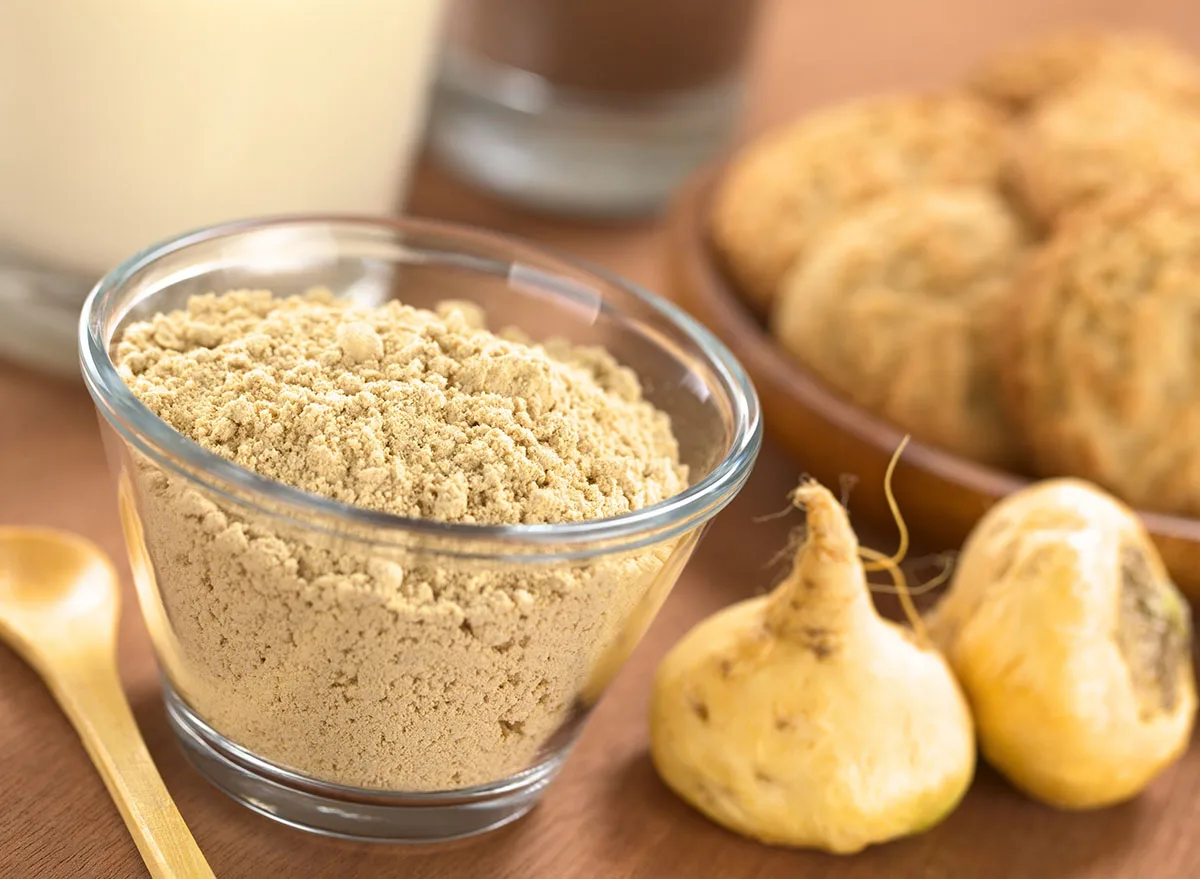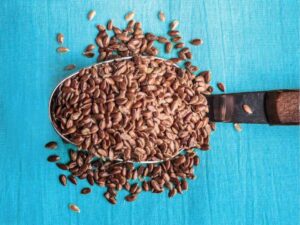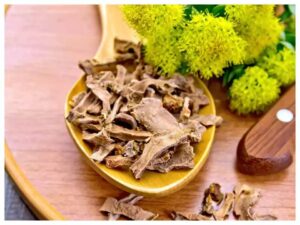The History of Maca Root Discovery
Maca Root, also known as Lepidium meyenii, is a root vegetable native to the Andes Mountains in South America. For centuries, Maca Root has been used by indigenous people for its numerous health benefits, including Energy, Hormonal Balance, and Sexual Function. But where and when did this superfood first come to the attention of the world?
Maca Root in Ancient Peru
The use of maca root dates back to the ancient Inca civilization, who lived in the Andes Mountains of South America between the 12th and 16th centuries. The Incas valued maca root for its ability to increase energy, stamina, and endurance and used it to enhance the physical abilities of their warriors. They also used maca root as a form of currency and as a staple food in their diets.
Re-discovery by Spanish Conquistadors
When the Spanish Conquistadors arrived in South America in the 16th century, they encountered the use of maca root and documented its medicinal properties. They reported its ability to enhance physical and sexual performance, increase fertility, and improve overall health. However, its use declined with the arrival of the Spanish, who suppressed the indigenous culture and replaced their traditional foods and medicines with their own.
Modern Day Usage
In the 20th century, the use of maca root was rediscovered by Peruvian scientists and medical practitioners. They conducted extensive research on the root and confirmed its medicinal properties, leading to a resurgence of its usage in Peru. Today, maca root is widely grown in the Andes Mountains of Peru and is exported to other countries for use in supplements, foods, and cosmetics.

The Marvelous Benefits of Maca Root for Health
Introduction
Maca root is a plant that grows in the Andean Mountains of Peru. The root is used as a vegetable and medicinal herb in Peru, and has been consumed for its various health benefits for over 3,000 years. The scientific name of maca is Lepidium meyenii, and it is a member of the brassica family. Maca root is also known as Peruvian ginseng, and is commonly available in powder form, which can be added to smoothies, yogurt, or other foods. In this article, we will discuss the various health benefits of maca root.
Improves Sexual Function
One of the most well-known benefits of maca root is its ability to improve sexual function. Several studies have shown that maca can increase libido and improve erectile dysfunction in men. A 2009 study published in the journal “Andrologia” found that men who took maca for 12 weeks had an improvement in sexual desire compared to those who took a placebo. Another study published in the journal “BMC Complementary and Alternative Medicine” found that men who took maca for 8 weeks had an improvement in erectile dysfunction compared to those who took a placebo. In addition, a 2015 review of several studies on maca and sexual function found that maca was effective in improving sexual function in both men and women.
Boosts Energy and Endurance
Maca root has been used by athletes for its ability to boost energy and endurance. A 2009 study published in the “Journal of Ethnopharmacology” found that maca improved physical performance in male cyclists. The study found that maca increased the time it took for the cyclists to become exhausted, and also improved their oxygen uptake during exercise. Another study published in the “Journal of Strength and Conditioning Research” found that maca improved endurance and reduced fatigue in male athletes.
Reduces Symptoms of Menopause
Maca root has been shown to be effective in reducing the symptoms of menopause. A 2006 study published in the journal “Menopause” found that women who took maca for 6 weeks had a reduction in the frequency and severity of hot flashes and night sweats. In addition, a 2011 review of several studies on maca and menopause found that maca was effective in reducing the symptoms of menopause, including hot flashes and night sweats.
Improves Mood and Reduces Anxiety
Maca root has been shown to improve mood and reduce anxiety. A 2008 study published in the journal “Phytomedicine” found that maca improved mood and reduced anxiety in postmenopausal women. Another study published in the journal “CNS Neuroscience and Therapeutics” found that maca reduced symptoms of depression and anxiety in women with mild depression.
Increases Fertility
Maca root has been shown to increase fertility in both men and women. A 2016 review of several studies on maca and fertility found that maca was effective in improving semen quality and increasing sperm count in men. In addition, a 2014 study published in the journal “Evidence-Based Complementary and Alternative Medicine” found that women who took maca had an increase in the number of mature eggs they produced.
Lowers Blood Pressure
Maca root has been shown to lower blood pressure in some people. A 2015 study published in the journal “Phytotherapy Research” found that maca reduced blood pressure in postmenopausal women who had mild hypertension. Another study published in the journal “Food and Chemical Toxicology” found that maca reduced blood pressure in rats with high blood pressure.
Boosts Immune System
Maca root has been shown to boost the immune system. A 2009 study published in the journal “Phytotherapy Research” found that maca increased the production of white blood cells in rats, which are an important part of the immune system. Another study published in the journal “Food and Chemical Toxicology” found that maca increased the activity of natural killer cells, which are responsible for fighting off infections and cancer.
Improves Skin Health
Maca root has also been shown to improve skin health. A 2018 study published in the journal “Biomedicine & Pharmacotherapy” found that maca reduced skin damage caused by UV radiation in mice. The study found that maca increased the activity of antioxidant enzymes, which help to protect the skin from damage caused by free radicals. In addition, a 2014 study published in the journal “International Journal of Dermatology” found that maca improved skin hydration and elasticity in postmenopausal women.
Reduces Inflammation
Maca root has been shown to have anti-inflammatory properties. A 2018 study published in the journal “Phytomedicine” found that maca reduced inflammation in rats with induced arthritis. The study found that maca reduced the levels of inflammatory markers in the rats, and also reduced the severity of arthritis symptoms. In addition, a 2017 study published in the journal “Phytotherapy Research” found that maca reduced inflammation in rats with induced colitis.
Increases Bone Density
Maca root has been shown to increase bone density. A 2010 study published in the journal “BMC Complementary and Alternative Medicine” found that maca increased bone density in rats with induced osteoporosis. The study found that maca increased the levels of bone-building cells in the rats, which led to an increase in bone density. In addition, a 2014 study published in the journal “Menopause” found that maca improved bone density in postmenopausal women.
Conclusion
Maca root has been used for its various health benefits for over 3,000 years. It is known to improve sexual function, boost energy and endurance, reduce symptoms of menopause, improve mood and reduce anxiety, increase fertility, lower blood pressure, boost the immune system, improve skin health, reduce inflammation, and increase bone density. Although more research is needed to fully understand the mechanisms behind these benefits, the existing evidence suggests that maca root is a powerful and versatile plant with many health-promoting properties. If you are interested in trying maca root for its health benefits, be sure to talk to your healthcare provider first to ensure that it is safe for you to do so.

Nutritional Components and Core Ingredients of Maca Root
Maca root is a root vegetable that is native to the Andes Mountains in South America. It is a member of the cruciferous family, which includes other vegetables such as broccoli and cauliflower. Maca root is a highly nutritious food that has been used for centuries by the indigenous people of the Andes as a staple food and as a natural remedy for various health conditions.
Carbohydrates
Maca root is a rich source of carbohydrates, providing approximately 59% of its total calories. These carbohydrates provide a quick and sustained source of energy, making it a popular food among athletes and people who need to maintain high levels of physical activity. The carbohydrates in maca root are primarily composed of starches, which are slowly digested and absorbed, providing a steady supply of energy over a longer period of time.
Fiber
Maca root is also a good source of fiber, providing approximately 4% of its total calories. Fiber is important for maintaining healthy digestion and regular bowel movements, as well as reducing the risk of heart disease, stroke, and certain types of cancer. Fiber also helps to regulate blood sugar levels, making maca root a good choice for people with diabetes.
Proteins
Maca root is a modest source of protein, providing approximately 10% of its total calories. The proteins in maca root are high in essential amino acids, which are the building blocks of all proteins in the body. These essential amino acids are important for the growth, repair, and maintenance of tissues, as well as for the production of hormones and enzymes.
Fats
Maca root is a low-fat food, providing approximately 2% of its total calories. The fats in maca root are primarily unsaturated, with a small amount of saturated fat. Unsaturated fats are important for maintaining good heart health and reducing the risk of cardiovascular disease. Saturated fats, on the other hand, should be consumed in moderation as they can contribute to the development of heart disease.
Vitamins and Minerals
Maca root is a good source of vitamins and minerals, including vitamin C, potassium, and iron. Vitamin C is important for the production of collagen, which is necessary for healthy skin, hair, and nails. Potassium is important for maintaining healthy blood pressure, as well as for proper muscle and nerve function. Iron is important for the production of hemoglobin, which carries oxygen to the cells in the body.
Secondary Metabolites
Maca root is also a rich source of secondary metabolites, including glucosinolates, polyphenols, and alkaloids. Glucosinolates are compounds that have been shown to have anti-cancer and anti-inflammatory properties, as well as to enhance the immune system. Polyphenols are powerful antioxidants that protect the body against oxidative stress and damage. Alkaloids are compounds that have been shown to have a stimulating effect on the central nervous system, as well as to improve mental clarity and focus.
Phytosterols
Maca root is a rich source of phytosterols, which are compounds that are structurally similar to cholesterol. Phytosterols have been shown to lower cholesterol levels in the blood, reducing the risk of heart disease. Phytosterols also have anti-inflammatory and immune-enhancing properties, as well as to improve bone health and reduce the risk of osteoporosis.
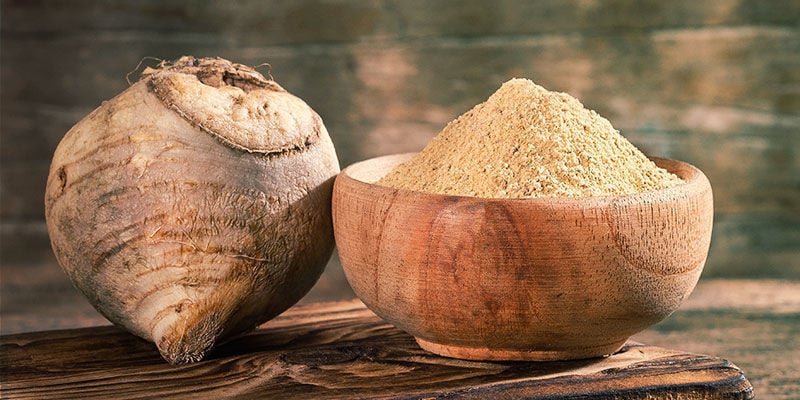
Methods for Consuming Maca Root
Maca root is a highly nutritious root vegetable that is native to the Andes Mountains in South America. It is a staple food among the indigenous people of the Andes and has been used for centuries as a natural remedy for various health conditions. Maca root is available in various forms, including dried, powdered, liquid extract, and capsule form, making it easy to incorporate into your diet.
Cooking Maca Root
Maca root can be cooked and consumed in a variety of ways. The most common method of cooking maca root is boiling it, which can be done either on its own or with other ingredients. Boiled maca root can be mashed or pureed to make a creamy and nutritious side dish, or it can be added to soups, stews, or casseroles.
Another popular method of cooking maca root is roasting it, which brings out its natural sweetness and nutty flavor. Roasted maca root can be used as a topping for yogurt or oatmeal, or as a snack on its own. Maca root can also be added to smoothies and juices, or used as a substitute for other sweeteners in baking recipes.
Maca Root Powder
Maca root powder is the most widely available form of maca root and is made by grinding dried maca root into a fine powder. Maca root powder can be added to smoothies, juices, and other drinks, or used as a substitute for flour in baking recipes. Maca root powder is also available in capsule form, making it an easy and convenient way to incorporate maca root into your diet.
Maca Root Liquid Extract
Maca root liquid extract is made by soaking maca root in a solution of water and alcohol, which extracts its active compounds. Maca root liquid extract can be added to drinks, smoothies, and juices, or taken directly by the spoonful. Liquid extract is a more concentrated form of maca root and is therefore more potent than powder or dried form.
Maca Root Supplements
Maca root is also available in supplement form, either in capsule or tablet form. Maca root supplements are a convenient and easy way to incorporate maca root into your diet and are a good option for people who don’t like the taste or texture of maca root in its raw or cooked form. Maca root supplements are also standardized, which means that the potency and quality of the maca root is guaranteed.
Dosage and Safety Considerations
Maca root is generally considered safe and well-tolerated when consumed in moderate amounts. There is no established daily recommended intake for maca root, but most experts recommend taking 1-3 grams of maca root powder or equivalent per day. Maca root should not be consumed in large amounts, as it may cause digestive discomfort, nausea, or other adverse effects.
Maca root should not be taken by women who are pregnant or breastfeeding, as there is not enough information about its safety in these populations. Maca root may also interact with certain medications, including blood pressure medications, hormones, and antidepressants, so it is important to consult with a healthcare professional before taking maca root supplements.
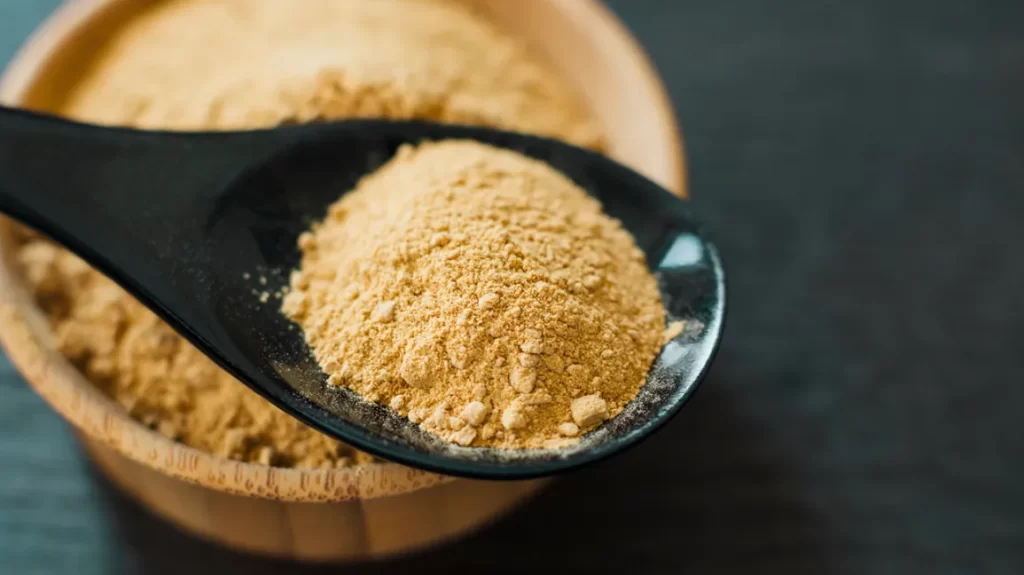
Potential Side Effects and When to Avoid Taking Maca Root
Maca root is a highly nutritious root vegetable that is native to the Andes Mountains in South America. It is a staple food among the indigenous people of the Andes and has been used for centuries as a natural remedy for various health conditions. While maca root is generally considered safe, it is important to be aware of its potential side effects and when to avoid taking it.
Digestive Discomfort
Maca root can cause digestive discomfort in some individuals, including bloating, gas, and abdominal pain. These symptoms are most likely to occur in people who are not used to consuming high-fiber foods or who have a sensitive digestive system. To reduce the risk of digestive discomfort, it is recommended to start with a small dose of maca root and gradually increase over time.
Hormonal Imbalance
Maca root has been shown to have an impact on hormone levels, particularly in women. Maca root contains compounds that can affect the production of estrogen, progesterone, and other hormones. This can lead to hormonal imbalances and may cause symptoms such as hot flashes, mood swings, and irregular menstrual cycles. Women who have a history of hormonal imbalances or who are taking hormone replacement therapy should consult with their healthcare provider before taking maca root.
Interactions with Medications
Maca root may interact with certain medications, including blood pressure medications, hormones, and antidepressants. Maca root can affect blood pressure levels and hormone levels, which can in turn affect the effectiveness of certain medications. Additionally, maca root can increase the risk of side effects or toxicity when taken with certain medications. If you are taking any medications, it is important to consult with a healthcare professional before taking maca root.
Pregnancy and Breastfeeding
Maca root is not recommended for women who are pregnant or breastfeeding, as there is not enough information about its safety in these populations. Maca root can affect hormone levels and may have other effects on the developing fetus or infant. Women who are pregnant or breastfeeding should avoid taking maca root and consult with their healthcare provider before taking any new dietary supplement.
Allergic Reactions
Maca root can cause allergic reactions in some individuals, including itching, hives, and difficulty breathing. Allergic reactions are most likely to occur in people who are allergic to other members of the brassica family, such as broccoli, cauliflower, and mustard. If you have a history of allergies or have experienced an allergic reaction to any other food or supplement, it is important to talk to your healthcare provider before taking maca root.
Overdose
Maca root is generally considered safe when consumed in moderate amounts, but taking large amounts of maca root can lead to overdose and serious side effects. Symptoms of maca root overdose can include nausea, dizziness, and headaches. To reduce the risk of overdose, it is recommended to stick to the recommended dosage of maca root and not exceed the recommended amount.
The Drug Interactions of Maca Root
Maca root is a root vegetable that is native to the Andes Mountains in South America and has been used for centuries as a natural remedy for various health conditions. While maca root is generally considered safe, it is important to be aware of its potential drug interactions. Maca root can interact with certain medications and affect the effectiveness of these drugs or increase the risk of side effects.
Blood Pressure Medications
Maca root can affect blood pressure levels and may interact with blood pressure medications. Maca root can lower blood pressure levels, which can cause blood pressure to drop too low when taken with blood pressure medications. This can increase the risk of side effects, including dizziness, fainting, and confusion. If you are taking blood pressure medications, it is important to talk to your healthcare provider before taking maca root.
Hormones
Maca root contains compounds that can affect hormone levels and may interact with hormone medications. Maca root can affect the production of estrogen, progesterone, and other hormones, which can in turn affect the effectiveness of hormone medications. Additionally, maca root can increase the risk of side effects or toxicity when taken with hormone medications. If you are taking hormone medications, it is important to consult with a healthcare professional before taking maca root.
Antidepressants
Maca root may interact with certain antidepressants and affect the effectiveness of these drugs. Maca root can increase the risk of side effects, including nausea, dizziness, and headaches. If you are taking antidepressants, it is important to talk to your healthcare provider before taking maca root.
Other Medications
Maca root may interact with other medications and affect the effectiveness of these drugs. Maca root can increase the risk of side effects or toxicity when taken with certain medications. If you are taking any medications, it is important to consult with a healthcare professional before taking maca root.
Here are 10 useful links to refer to information on Maca Root:
- Mayo Clinic: A trusted source for information on Maca Root and its potential side effects and drug interactions.
- Examine.com: A database of information on Maca Root, including its benefits, uses, and scientific research.
- NCBI: A scientific study on the benefits of Maca Root, including its effects on hormone levels, sexual function, and energy levels.
- PubMed: A database of peer-reviewed research on Maca Root, including its benefits, uses, and potential side effects.
- Drugs.com: A comprehensive resource for information on Maca Root, including its potential drug interactions and side effects.
- Herb Wisdom: An informative article on Maca Root, including its historical uses, health benefits, and side effects.
